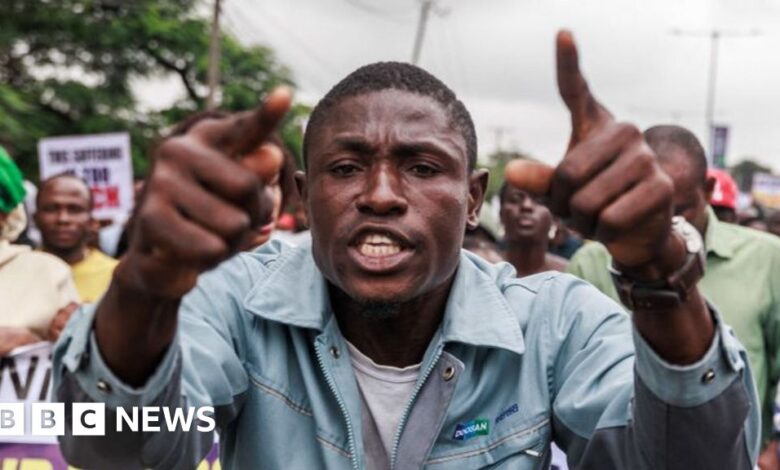Nigerians under 24-hour curfew amid protests

Millions of residents in northern Nigeria have been placed under a 24-hour curfew amid nationwide protests over the high cost of living.
The governments of Kano, Jigawa, Yobe and Katsina states have ordered local residents not to leave their homes – and therefore not to join protests – on Friday.
Authorities said the curfew was necessary because “thugs” had taken advantage of the protests to loot and destroy property.
Security forces are on high alert across the country with nine more “days of rage” planned by movement organisers.
On the first day, protests in the northern city of Kano attracted the largest number of participants.
Police fired live ammunition and tear gas – and doused it with hot water – to try to disperse thousands of protesters. Three people were shot dead and many more were injured.
Looters also raided a warehouse near the Kano governor’s house and police said 269 people were arrested along with the seizure of 25-litre drums of groundnut oil and other items.
Thirteen protesters across Nigeria were killed by security forces on the first day of protests, according to human rights group Amnesty International.
Four people were killed in an “explosion” amid a crowd of protesters in northeastern Nigeria’s Borno state on Thursday night, Nigerian police chief Kayode Egbetokun said.
Thirty-four others were “seriously” injured, he said.
A curfew was imposed there after anti-government protesters began marching in the state capital Maiduguri, although authorities cited an earlier explosion as the reason for Borno to join neighbouring states in imposing a 24-hour lockdown.
According to local reports, an explosion on Wednesday night killed 16 people at a tea shop in the rural community of Kawori.
No one has said they were behind the attack, but locals suspect it was carried out by the notorious jihadist group Boko Haram, which has been active in the northeast since 2009.
On Friday, protesters rallied in major cities across the country. In the capital Abuja, police fired tear gas to stop protesters from marching into the city center and other satellite towns.
In Lagos, Nigeria’s largest city, some banks and shops have reopened after being closed on the first day of protests – and internet connections remain patchy.
Inspector General Egbetokun said he had put his officers on “red alert”. He added that police were ready to respond quickly to any threat to public safety and order.
Nationwide protests were organized via social media using the hashtag #EndBadGovernance and inspired by Recent success of protesters in Kenyawho forced the government there to cancel plans to raise taxes.
During Thursday’s largely peaceful protests in the south, protesters chanted slogans such as: “We are hungry.”
Many of them are angry that President Bola Tinubu has abolished fuel subsidies – announced with immediate effect in his inaugural speech in May 2023.
The measure was intended to cut government spending, but it sent gasoline prices soaring, with spillover effects to other goods, such as food.
Protesters also want the government to carry out sweeping reforms to the country’s electoral and judicial systems.
Kano governor’s spokesman, Abba Kabir Yusuf, said protests there had been largely peaceful but the curfew was necessary because of “rampant looting, destruction of property and violence” by “thugs”.
Similarly, the Yobe State Government has imposed a curfew in Potiskum, Gashua and Nguru areas, where authorities said “thugs are taking advantage of the protests to vandalize and loot government and private properties”.
Katsina authorities said “bad guys” had “manipulated the protest” there.
Additional reporting by BBC’s Azeezat Olaoluwa




